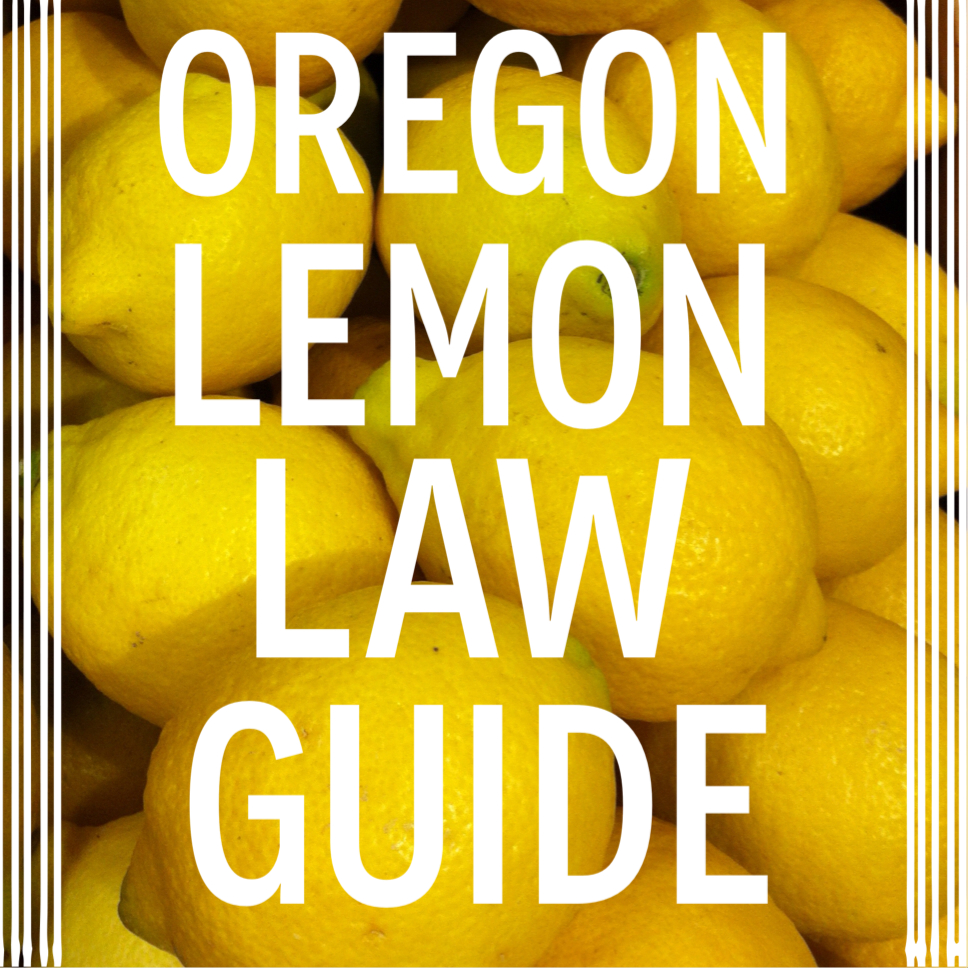
Oregon Lemon Law Guide
If you buy a car and find out it is defective, or a “lemon,” you may be able to get help through Oregon’s Lemon Law. The following guide is not legal advice but can help you understand what rights you have.

1. What is the Lemon Law?
2. Does the Lemon Law apply to my vehicle?
3. What does the Lemon Law say about used cars?
4. Who can file a Lemon Law claim?
5. How do I file a Lemon Law claim?
6. Where can I get help with a Lemon Law claim?
7. What can I expect from a Lemon Law claim?
8. History of Lemon Laws
What is the Lemon Law?
Oregon’s Lemon Law allows consumers whose vehicles are persistently malfunctioning to receive a replacement vehicle or some form of compensation if they meet certain criteria.
Does the Lemon Law apply to my vehicle?
Oregon’s Lemon Law only applies to new vehicles: As indicated by the Oregon Department of Justice, within 2 years or 24,000 miles from the purchase or lease of a new vehicle, the owner of that vehicle may be eligible for compensation if all of the following conditions are met:
- A part of the vehicle that is covered by a manufacturer warranty is not working and this malfunction would significantly affect operation, safety or value of the vehicle.
- The malfunction is reported to the manufacturer or dealer, so that the manufacturer or dealer can fix the malfunction.
- There have been at least three unsuccessful attempts by the dealer or manufacturer to fix the malfunction, unless the malfunction could cause “injury or death,” in which case only one unsuccessful attempt needs to be made. Alternatively, the vehicle may qualify for protection if it takes a dealer or manufacturer 30 or more business days to fix the malfunction.
For example, if you are within 2 years and 24,000 miles of the purchase of your new car and the brakes fail to operate properly, there would be a significant danger to operating the car and could qualify the owner or lessee of that car to file a Lemon Law claim after one repair attempt. If the car’s sunroof was misaligned, and caused the car to flood and reek of mildew and could not be repaired in 3 attempts that would probably allow a Lemon Law claim. But if the car is “too noisy” or the entertainment system occasionally does not work, you probably do not have a claim under the Lemon Law for protection, although you may be able to pursue other legal remedies.
What does the Lemon Law say about used cars?
Oregon does not have a Lemon Law that applies to used cars, however you may still qualify for protection under other laws such as the Federal Trade Commission’s “Used Car Rule” and Oregon’s Uniform Commercial Code through circumstances such as:
- The dealer did not indicate the sale of a vehicle was “as-is”
- The dealer failed to include a “Buyers’ Guide” with the vehicle, that failed to indicate any of the following: if the care would be sold as-is; if there was a warranty on the vehicle; how much or if repair costs would be covered by the dealer to fix problems covered under the warranty; a list of serious malfunctions that can appear in used cars.
- If dealers commit fraud, including lying about the qualities of the vehicle or other circumstances outlined by the Federal Trade Commission dealers may have to pay for repairs, refunds or even punitive damages.
Who can file a Lemon Law claim?
You may be eligible to file a claim if you are the owner or lessee of a vehicle as long as your sole reason for buying the vehicle was not to resell it.
How do I file a Lemon Law claim?
First, prepare documentation of the problem with your car including pictures or videos of the problem if visible, any notes from mechanics who worked on the vehicle, records of attempts by the dealership or manufacturer to fix the vehicle and receipts from any fees or costs associated with the car.
Second, make copies of all your documentation.
Third, if the manufacturer of your vehicle has an informal dispute resolution system with an arbitrator, you may need to pursue that process before you can be allowed to file a claim in court. Most major manufacturers have some kind of dispute resolution. You can learn if the manufacturer of your vehicle has a dispute resolution process and what that process is by looking at the “Support” webpage on each manufacturers’ website (like Toyota’s here) or by doing an internet search for: “(the name of the manufacturer) dispute resolution.” However, you are not required to stop pursuing your case in court after dispute resolution through arbitration. Even if you agree to enter into informal arbitration, only the manufacturer is bound to obey the decision resulting from informal dispute resolution whereas a consumer can still pursue a legal remedy.
Finally, if there is no informal dispute resolution system available to you or you have exhausted that process, you may file a Lemon Law claim in court, usually by hiring an attorney. You can find an attorney through websites such as the National Association of Consumer Advocates or the Oregon State Bar.
The Oregon Department of Justice has the authority to certify that informal dispute resolution systems meet certain minimum standards. To check if your car’s manufacturer’s informal dispute resolution system meets minimum standards, contact the Oregon Department of Justice.
Where can I get help with a Lemon Law claim?
If you believe you may have a reason to make a claim, you can find a referral to legal services through the Oregon State Bar, toll-free from within Oregon at (800) 452-7636 or (503) 684-3763 and also at the Oregon State Bar website.
What can I expect from a Lemon Law claim?
If you file a successful claim you may receive a replacement or refund of the purchase price of the same kind of car (minus a reasonable allowance for the use of the car). You may also qualify to receive compensation for lease payments, taxes, and fees from purchasing the car as well as potential compensation for attorney’s fees.
History of Lemon Laws:
Every state now has a new car Lemon Law to protect consumers in what often turns out, after their home and college expenses, to be on one of a consumers’ largest purchases. Prior to the passage of the first new car Lemon Laws, consumers had no direct contract with a manufacturer, which made it difficult to pursue claims that were not actually the dealer’s fault. The Lemon Law also specifically defined a “lemon car,” so consumer attorneys did not have to go through expensive expert-witness proceedings in court to “prove” that each car’s defects were serious. OSPIRG worked to help pass Oregon’s first version of a new car Lemon Law in 1983.
Topics
Find Out More


Trouble in Toyland 2023

VR risks for kids and teens

